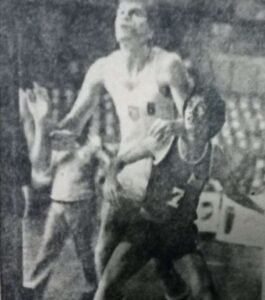
by Henry L. Liao
The Philippines first played host to the FIBA World Cup (known as the World Basketball Championship since 2014) during its 8th edition from October 1-14, 1978.
The country was awarded the hosting rights even as our topnotch players have turned professional with the birth of the Philippine Basketball Association (PBA) three years earlier.
With the FIBA still more than a decade away from introducing its “open basketball” policy in 1989 that allowed pros to take part in its organized tournaments, our ragtag national team was composed of the best players from the amateur ranks.
The 1978 games attracted 14 teams, including our Asian neighbor’s People’s Republic of China (11th place) and South Korea (13th).
As hosts, our boys were automatically seeded into the eight-team championship phase, along with the old Soviet Union, then the defending titlist.
The Philippines finished with a 0-8 record – losses in the seven round-robin games plus the seventh-to-eighth-place classification game against Australia where we were beaten, 92-74, but ranked eighth overall ahead of the six teams that were relegated to the consolation round after the preliminary phase.

Ramon Cruz topped the Filipinos with an 11th-ranking 16.5-point average in eight appearances in the tournament, including a high of 33 in a 99-88 loss to sixth-place Canada.
A 5-11, 150-pound forward, the then 22-year-old Cruz also netted 31 markers in a 117-101 loss to Yugoslavia, which eventually topped the tournament with an 82-81 overtime decision over the Soviet Union in the gold-medal game. (Brazil edged Italy, 86-85, to settle for the bronze.)

Bernardo (Joy) Carpio and team skipper Alexander Carino each averaged 9.6 ppg for the Filipinos.
Other members of the PH team were Stephen Watson, Eduardo Merced, Federico (Padim) Israel Jr., Federico Lauchengco, Nathaniel (Nael) Castillo, Gregorio (Yoyong) Gozum, Jr., Leopoldo Herrera, Caesar Yabut, and Cesar Teodoro. The head coach was Nicanor Jorge.
Drazen Dalipagic was named the 8th WBC Most Valuable Player. He was joined on the All-Tournament team by compatriots Kresimir Cosic and Dragan Kicanovic, Brazil’s Oscar Schmidt, and the Soviet Union’s Vladimir Tkachenko.
The top 10 scorers in the tournament were 1-Kamil Brabenec (Czechoslovakia), 26.9 ppg; 2-Zhang Weiping (People’s Republic of China), 25.1; 3-Choi Bu-Young (South Korea), 21.1; 4-Drazen Dalipagic (Yugoslavia), 20.0; 5-Oscar Schmidt (Brazil), 19.0; 6-Leo Rautins (Canada), 17.9; 7-Marcel De Souza (Brazil), 17.7; 8-Dragan Kicanovic (Yugoslavia), 16.5; 9-Renzo Bariviera (Italy), 16.2; and 10-Marcos Antonio Leite (Brazil), 14.7.
+++
A week before the tournament unwrapped, Yugoslavia and Canada played an exhibition game against PBA powerhouses Crispa and Toyota, respectively, in a doubleheader witnessed by a crowd of 25,000 at the Araneta Coliseum.
The Yugoslavs, who eventually captured the World crown with an unblemished 10-0 record, manhandled Crispa, 108-92. The Redmanizers showed up for the game without William (Bogs) Adornardo and Bernard Fabiosa and with Fortunato (Atoy) Co Jr. bothered by sore eyes.
Toyota, on the other hand, beat eventual sixth-placer Canada, 92-88, behind the heroics of Robert Jaworski, who with 6.6 seconds to play, intercepted a Canadian throw-in to prevent a potential 90-all deadlock at the buzzer. And to ice the game, the Big J sank a pair of free throws for the final score.
The Philippine team, upon the request of the old Czechoslovakia, also agreed to a tuneup game with the Czechs and was beaten black and blue to the tune of 105-70. The European nation ranked ninth at the tournament’s end.
- GOLD FOR OBIENA? - July 25, 2024
- Diana Taurasi’s Golden Opportunity at the 2024 Paris Olympics - July 10, 2024
- Auerbach’s 12 Favorite Playoff Players - June 5, 2024

